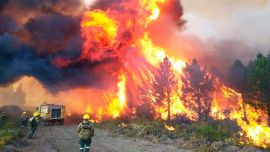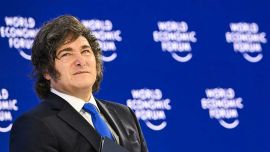That iconic 9/11 means two different dates on either side of the Atlantic (November 9 in the Old World and September 11 in the New) and curiously enough, both represent veritable milestones in world history – so much so that both have been presented as the real turning-point of the last century (and millennium) rather than the actual millennial year of 2000. The fall of the Berlin Wall on November 9, 1989, was seen as early closure for the 20th century by some, such as the historian Eric Hobsbawm who somewhat self-indulgently placed its beginning in the year of his birth (and also the Russian Revolution), 1917, thus making it the shortest century in history (even if his book, Age of Extremes, the short Twentieth Century, stretched it out to 1914-91). And so it seemed until the 9/11 exactly 20 years ago today when hijacked aircraft smashing into the Twin Towers symbolically destroyed world trade as much as the World Trade Center quite literally.
At a stroke the Berlin Wall appeared to mark the end of the Cold War rather than Francis Fukuyama’s end of history with the 21st century beginning much closer to its mathematical start. Just as in the preceding generation everybody seemed to remember exactly what they were doing on the day of John Kennedy’s assassination in 1963, so 9/11 has remained the object of universal recall in the last 20 years. The terrorist mega-atrocity had such a powerful personal impact on me at the Buenos Aires Herald newsroom that it monopolised the editorials for the next 17 days running – in all the 9,282 editorials I have written for the Herald and this newspaper since 1985, there has never been a streak nearly as long.
Nevertheless, just as the Berlin Wall was supplanted by the Twin Towers, so 9/11 now stands challenged as a rewind in world history by the coronavirus pandemic – perhaps a reversible verdict since a return to what was once normal is not entirely impossible. In sheer numbers at least the harm inflicted by an invisible virus far eclipses the almost 3,000 fatalities resulting from the collapse of 94-storey towers – the Covid-19 death toll in the United States alone topped 4,000 daily several times since January 7 throughout last winter, now topping 650,000 (and counting) with the Delta variant on the loose. Yet in less quantitative terms the impact is not comparable. Covid-19 deaths are as invisible as the virus with the health protocols preventing anybody from seeing mostly senior citizens breathing their last after several weeks of iron lung whereas the dramatic images of the Twin Towers attacks shocked television audiences worldwide.
So could that spectacular atrocity recur now that history has repeated itself with the Taliban again entrenched in Afghanistan? It could, of course, but the impact would not be quite the same since the world has changed in the last 20 years. The 9/11 terrorist audacity was all the more striking because it destroyed in a flash such a supreme symbol of global power in an increasingly globalised planet as the World Trade Center, less than 700 metres away from Wall Street. And just to place the supremacy of the latter in its 2001 context, 9/11 was preceded by the dot-com bubble burst peaking in early 2000 (due to the failure of the Internet-related companies to devise a revenue model to match their technological prowess) while coming several years before the 2008-2009 subprime crisis threatened the entire financial system. Today’s downtown Manhattan regrouping from coronavirus no longer symbolises that financial and commercial supremacy – that power has now shifted West (to Silicon Valley and even further to China in world trade terms) while Big Tech calls the shots in business rather than high finance. To deal a comparable blow to the system as 9/11, today’s public enemies would probably need to evolve into cyberterrorists and cripple, say, Google for hours or days.
The fact that the Taliban overran Kabul less than a month before today’s anniversary obviously sends alarm-bells ringing as to a 9/11 replay. The August 26 Islamic State-Khorasan attack on the airport killing more than 100 people (including over a dozen US troops covering the mass retreat) delivered notice of their intention to take over where al-Qaeda left off and they are just warming up. The dangers of Afghan becoming a terrorist launching-pad under its Taliban comeback kids (who this week announced an “inclusive” Cabinet without women) are immediate with Western military and intelligence presence no longer on the ground but the change is more apparent than real. Was the late Osama bin Laden any more or less dangerous when based in Afghanistan than in Pakistan where he was finally slain in Abbottabad?
A focus on Afghanistan could even be dangerous if it distracts attention from the terrorist undercurrents which have constantly lurked in neighbouring Pakistan during all the 20 years while Kabul was in modernising hands. This is not said in the spirit of the “Paki-bashing” of the British skinheads who sporadically terrorised my existence during my Cambridge student days: Pakistan has the world’s fifth-largest population of over 220 million (overtaken only this week by the global total of coronavirus cases) and the vast majority are decent human beings capable of producing a Mayor of London (like the Multan-born father of Sadiq Khan) but its lunatic fringe is something fierce and numerous enough to churn out Jihadist suicide assailants in industrial quantities. Thus suspected 9/11 mastermind Khalid Sheikh Mohammed (whose trial has yet to conclude, incredibly enough) is Pakistani. But before going off on an Islamophobe rant, we should recall that the extreme right has caused more deaths in the United States at least than Jihad terrorism in the 20 years since 9/11.
Yet while the escalation of terrorist risks from a Taliban Afghanistan can be overrated, the fact remains that it ends a lengthy reprieve since Mosul was finally retaken from the ISIS (Islamic State of Iraq and Syria) caliphate in mid-2017 – that decade of terror between the 2005 7/7 London transit bombings and the Paris November attacks of 2015 had started to recede in the memory. The destruction of the Twin Towers 20 years ago today remains a unique horror which nobody had previously imagined but the two intervening decades have provided a new panoply of instruments whereby terrorism can defy the imagination – drones, 3D printers, even smartphones, all available to anybody via Amazon. Eternal vigilance remains the price of liberty, as Edmund Burke said even before the United States existed (in 1774).






















Comments